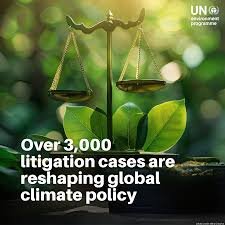
Abuja, Nigeria – A new report by the UN Environment Programme (UNEP) and the Sabin Centre for Climate Change Law has revealed a sharp rise in climate litigation cases worldwide, underscoring the growing role of courts in driving accountability and environmental action.
The report, titled “Climate Change in the Courtroom: Trends, Impacts, and Emerging Lessons,” shows that by June 2025, more than 3,099 climate-related cases have been filed across 55 countries and 24 international or regional tribunals — a marked increase from 2,180 in 2022.
UNEP Executive Director, Inger Andersen said climate litigation has become “a powerful global tool for advancing climate action and justice.”
“Transforming our energy, mobility, and food systems must be a collective effort,” Andersen noted. “Independent judicial systems are vital to ensure this transformation remains just and effective.”
The report highlights landmark rulings, including the Advisory Opinion of the International Court of Justice (ICJ), which clarified states’ obligations under international law to combat climate change.
It also notes the rise of anti-climate litigation, with lawsuits challenging environmental regulations and targeting climate advocates and journalists.
While most cases still originate from the Global North, UNEP observed a steady increase in cases from the Global South, signalling stronger engagement from developing nations.
The report concludes that climate litigation is reshaping global norms, bridging science, law, and justice in the pursuit of a sustainable planet.




